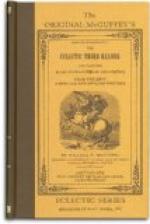This sale, completed May 15, 1890, did not then include the printing office and bindery belonging to the firm. These were used by the firm of Van Antwerp, Bragg & Co. until January 1, 1892, in manufacturing books ordered by the American Book Company. The American Book Company became, on May 15, 1890, the owners, by purchase, of all the copyrights and plates formerly owned by Van Antwerp, Bragg & Co. The four active partners in that firm, each of whom had then been in the schoolbook business some twenty-five or thirty years, entered the employ of the American Book Company. Mr. Bragg and Mr. Hinkle remained in charge of the Cincinnati business, Mr. Vail and Mr. Ambrose went to New York; the former as editor in chief, the latter was at first treasurer, but later became the president.
[A Vigorous Firm]
Van Antwerp, Bragg & Co. issued many new and successful books and remade many, including the McGuffey Readers and Speller, Ray’s Arithmetics and Harvey’s Grammars. Most of these met with acceptance and this was so full and universal throughout the central West as to give opportunity to the competing agents of other houses to honor Van Antwerp, Bragg & Co. with such titles as “Octopus” and “Monopoly,” names that were used before “Trusts” were invented. They also called the firm in chosen companies, “Van Anteup, Grabb & Co.” These were mere playful or humorous titles in recognition of the fact that this firm had, by its industry, skill and energy, captured a larger share of the patronage of the people than was agreeable to its competitors, and they, in despair of success by fair means, resorted to the old-fashioned method of calling their antagonist bad names. The best books, if pressed vigorously and intelligently, were sure to win in the end, and the people who used the books cared little what name appeared at the foot of the title-page.
In all important book contests the firm that holds possession of the field is much in the situation of the tallest man in a Kilkenny Fair. His head sticks up above the crowd and therefore gets the most knocks.
[Revisers and Editors]




